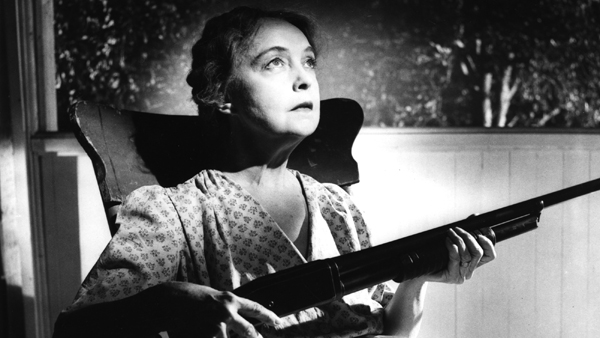You have no items in your cart. Want to get some nice things?
Go shoppingWhat was so unnerving about Charles Loughton’s 1950s thriller that it has taken over fifty years for it to be recognised as one of the great American Classics?
Charles Laughton’s The Night of the Hunter is a masterpiece of American Cinema. Shot in the style of German Expressionism, with the dark shadows and stylised dialogue that is typical of the movement, it is a hypnotic nightmare that touches on the tradition of morality tales in its reinterpretation of the thriller genre. Watching it is an oddly familiar experience as such melodramatic thrillers have been frequently parodied and it speaks to us in now very established cinematic language. The slanting and unreal sets all reinforce the chaotic nightmare that the children endure as they try to escape their very human monster. Yet this picture was a critical and financial disaster and Laughton never made another film. What was so unnerving about The Night of The Hunter that it has taken over fifty years to be recognised as one of the great American Classics?
Released in 1955 and following in the wake of McCarthyism, it is not surprising that audiences were unnerved and turned off by The Night of The Hunter. Set in depression-era America it highlights the ideologically flawed coming of consumerism. Opening with a robbery, Ben Harper (Peter Graves) tells his children that he has robbed a bank so that they will never wander the woods like the poor desperate children that are the victims of the depression. Sadly the robbery and essentially his greed sets in course a chain of events that will deprive his children of everything.
Before he is hanged Ben shares a prison cell with the murderous and misogynistic preacher Reverend Harry Powell, who quickly learns that Ben has hidden a fortune with his children. After Ben Harper is hanged, Harry Powell is set free to stalk his prey.
America has long been a country of religious radicalism and Laughton explores different interpretations of God with the two morally extreme characters of the film. There is a an Old Testament wrathful god, represented by the psychopathic reverend Harry Powell (Robert Mitchum), “I come not with peace, but with a sword’ and there is the nurturing New Testament God as seen in Rachel Cooper (Lillian Gish), “A strong old tree with many branches”. No where is this more apparent in the film than when Harry stalks the children at night – he waits outside singing a hymn intending to unnerve them while Ms Cooper is set on the porch, shot gun in hand. Ms Cooper joins in with the singing and creates a haunting duet – the menace has been transformed into beauty, and thus Laughton reminds the audience of the duality of Christian representations of God and of people’s interpretation of their deity. The idea of religion as personal choice and indeed an excuse for behaviour is reinforced time and time again throughout the film, whether it is the former adoring congregation of the reverend turned into a lynch mob, or Mrs. Cooper choosing always lighter more forgiving examples of the bible, instead of fire and Brimstone. We see how characters use religion to set a moral example and to justify evil.
There is something slightly at odds about the saccharine ending of The Night of The Hunter as Ms Cooper claims that the children “will abide and endure” but she says nothing of the corrupt ideology and society that has orphaned them, that as we know also abides and endures. The film is thematically complex as well as being visually intriguing, It is perhaps the oddly slanting motifs like the leaning artificial sets of the film that make the true meaning of this classic difficult to see clearly.

About Amy Howerska
Amy Howerska is an award winning stand up comedian and comedy writer. She is currently writing and appearing as a panellist on the new series of What’s The Story for BBC Radio Wales and her recent TV credits include The 50 Funniest Moments of 2012 (Channel 4) and Richard Hammond’s Secret Service (BBC1). Prior to her career in comedy Amy worked in the film industry for several years, most notably at the British Film Institute where she worked closely with iconic figures from the film world. Prior to this Amy was the test group for the first ever film module offered at Oxford University, she specializes in radical reinterpretations of heritage Cinema.





